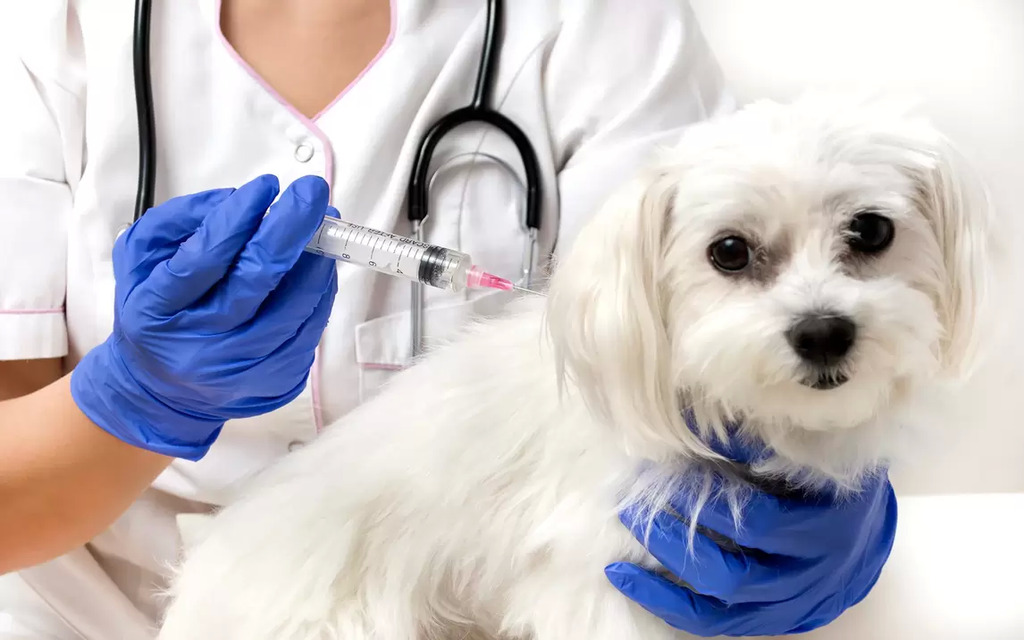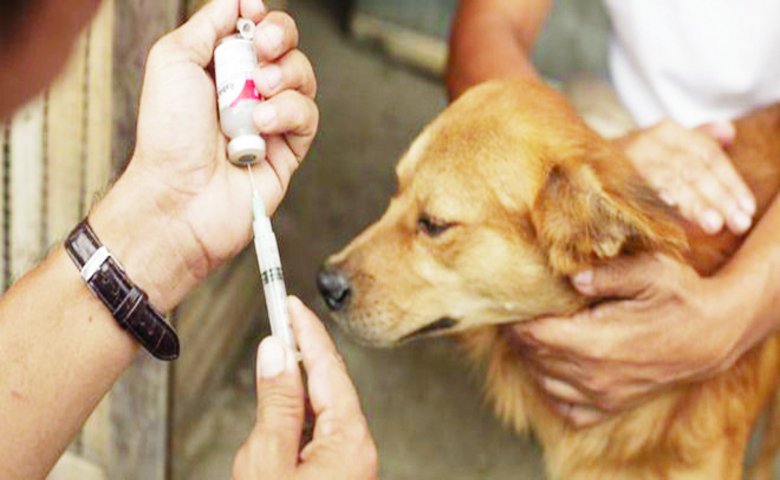All dogs, cats, and humans, are susceptible to the lethal viral disease rabies. It kills tens of thousands of individuals each year throughout the world and is spread to other animals by a bite or scratch.
In the United States, fox, raccoon, skunk, canine (coyote and dog), and bat populations all have rabies. Rabies primarily affects the neurological system and is transmitted by rabid animal bites via saliva or mucous membranes.
Even though canine rabies has mostly been eliminated in the United States, domestic animals like dogs, cats, cattle, horses, and people can still contract the disease from an infected animal. The greatest approach to safeguard everyone is to make sure rabies vaccine dose for dogs.
Table of Contents
Symptoms of Rabies
The length of time it takes for symptoms to appear, or the incubation period, is very diverse and dependent on a number of variables. These factors include the age of the animal that was bitten, the distance between the bite and the nervous system, and the quantity of the virus that was ingested.
The incubation period is from three to eight weeks for the majority of domestic species, but it can also be as little as nine days or as much as a year or more. The rabies virus infects and reproduces in the neurological system, resulting in the rabies clinical symptoms.
The excitatory form of rabies and the paralytic form are the two types. Animals don’t always go through both stages, and the symptoms can change.
- Vicious, unpredictable actions
- The mouth is foaming
- Increased sensitivity to auditory and visual stimuli
- Weakness
- Paralysis
- A respiratory failure-related death
In most cases, rabies causes mortality 3 to 8 days after the first sign of illness. For rabies, there is no cure. The good news is that this disease is easily avoidable by giving pets a rabies vaccine.
Rabies Vaccine Dose for Dogs
Because vaccines promote adaptive immunity, which is antigen-dependent and antigen-specific, the rabies vaccine specifically protects against contracting rabies. Vaccines must shield at least 88% of immunized animals against virulent virus challenge in order to receive a license in the US. There are numerous vaccines approved for use in domestic animals, and dogs can use vaccines that have been inactivated (killed).
Cats can have recombinant virus-vectored products, and wild animals can get oral modified live vaccinations, but these alternatives are not better than the inactivated rabies vaccine dose for dogs.
Should My Dog Get a Rabies Vaccination?

Yes! Respecting local laws and regulations and doing what is best for your pet’s health are both essential components of responsible pet ownership. A step in that process is making sure your dog has had the appropriate rabies vaccination. In most states, the only vaccination that is mandated by law is the rabies vaccine for dogs.
The rabies disease is dangerous. A living human or animal cannot be tested to determine whether they are infected, and once symptoms start to manifest, the disease is nearly invariably fatal.
In most states, rabies vaccine dose for dogs is mandated by law. State law may demand that your dog be detained for a lengthy amount of time or even put down if it is not current on its rabies vaccinations and is bitten by an animal in order to protect other animals and people. This is why it’s critical to maintain the efficacy of your dog’s vaccines.
Rabies Vaccine Schedule for Dogs

While state and municipal laws differ, the American Animal Hospital Association (AAHA) states that normal recommendations call for giving dogs no younger than 3 months of age a single dose of lethal rabies vaccine through injection under the skin or into the muscle.
Between 12 and 16 weeks of age, puppies often receive their first rabies vaccination, which triggers the production of antibodies by the immune system. Regardless of the dog’s age, a second single dose of the rabies vaccination is given a year later. Afterwards, it is given every three years.
| Dose 1 | 12 to 16 weeks |
| Dose 2 (Booster) | 1 year after first dose |
| Subsequent Boosters | Every 3 years |
If your dog is ever exposed to this dangerous disease, this canine vaccine plan will help strengthen their defenses. If a dog receives only one dosage of the vaccine and is ever exposed to the virus, that encounter counts as the second dose.
Side Effects of Dog Rabies Vaccine
The canine rabies vaccine has been used for a very long time and only rarely does it cause significant adverse responses. Some dogs may briefly lose hair at the injection location, however this is uncommon. Other adverse reactions to the canine rabies vaccine may include:
Modest Responses:
- Bruising at the injection site
- A temporary fever
- Swelling at the site of the injection
- Temporary exhaustion or appetite loss
Rare Reactions:
- Hives, which resemble solid bumps all over the body, are a rare reaction. They may itch.
- Nausea or diarrhea
- Face, eyes, or muzzle swelling
- Coughing
- Tumor growth near the injection site
- Fainting or collapsing
After your dog has had a rabies vaccination, call your veterinarian if you notice anything out of the ordinary. See your veterinarian about conducting antibody titers as an option for dogs who have severe vaccination responses.
Conclusion:
One of the best methods for avoiding rabies in people is still vaccinating dogs against the disease. In the future, vaccine regimens may change as a result of research that is now being done to assess the longevity of immunity via challenge tests. Since revaccination is not advised, antibody levels may be helpful for proving prior rabies vaccination in dogs entering rabies-free areas.
Frequently Asked Questions
1. How frequently does my dog need a rabies vaccination?
In the majority of states, between the ages of 14 and 16 weeks, your puppy will receive their first immunization, followed by a booster dose a year later.
After that, depending on state regulations and the vaccine used, your dog should have a rabies booster every one to three years. How frequently your dog should have booster shots will be advised by your veterinarian.
2. What is the cost of a dog’s rabies shot?
The rabies vaccine for dogs is simple to obtain, reasonably priced, and regarded as safe for your dog. A veterinarian will give your dog the vaccine after doing a physical examination since rabies is a public health hazard.
3. What makes rabies boosters necessary?
The body is taught to detect the disease by vaccinations, which trigger an immune response that, should the virus ever enter your dog’s body, will seek out and eliminate it.
This immunological response weakens and loses effectiveness with time. Booster shots help to rebuild your dog’s immunity so they can continue to be protected.
4. Do the vaccine’s side effects exist?
Many dogs will suffer some little soreness or swelling where they had their immunization, as well as a slight temperature and fatigue. This is entirely typical and normally goes away in a day or two. See your veterinarian if the side effects persist for more than two days or get worse.
The injection site may occasionally be hard and swollen for a few weeks. Take your dog to the vet if the swelling lasts longer than three weeks or gets bigger.
Occasionally, your dog could experience more severe adverse effects. They usually happen minutes to hours after getting the vaccination and need prompt medical intervention. Get your dog to the closest emergency vet immediately away if they encounter any of the following:
- Nausea or diarrhea
- Hives
- Swelling of the face, neck, or eyes, as well as the muzzle
- Severe coughing, breathing issues, and even collapse
5. Can a vaccinated dog obtain rabies?
Although rabies vaccines are incredibly successful, no vaccine can provide 100 percent protection. Hence, even if there is very little chance that a dog with rabies vaccination will get it, it is still a possibility.
The best defense is to continue administering your dog’s rabies shots as long as they are needed.
Image credit: Yandex.com
Also Read: Ways to Bond with Your Puppy















